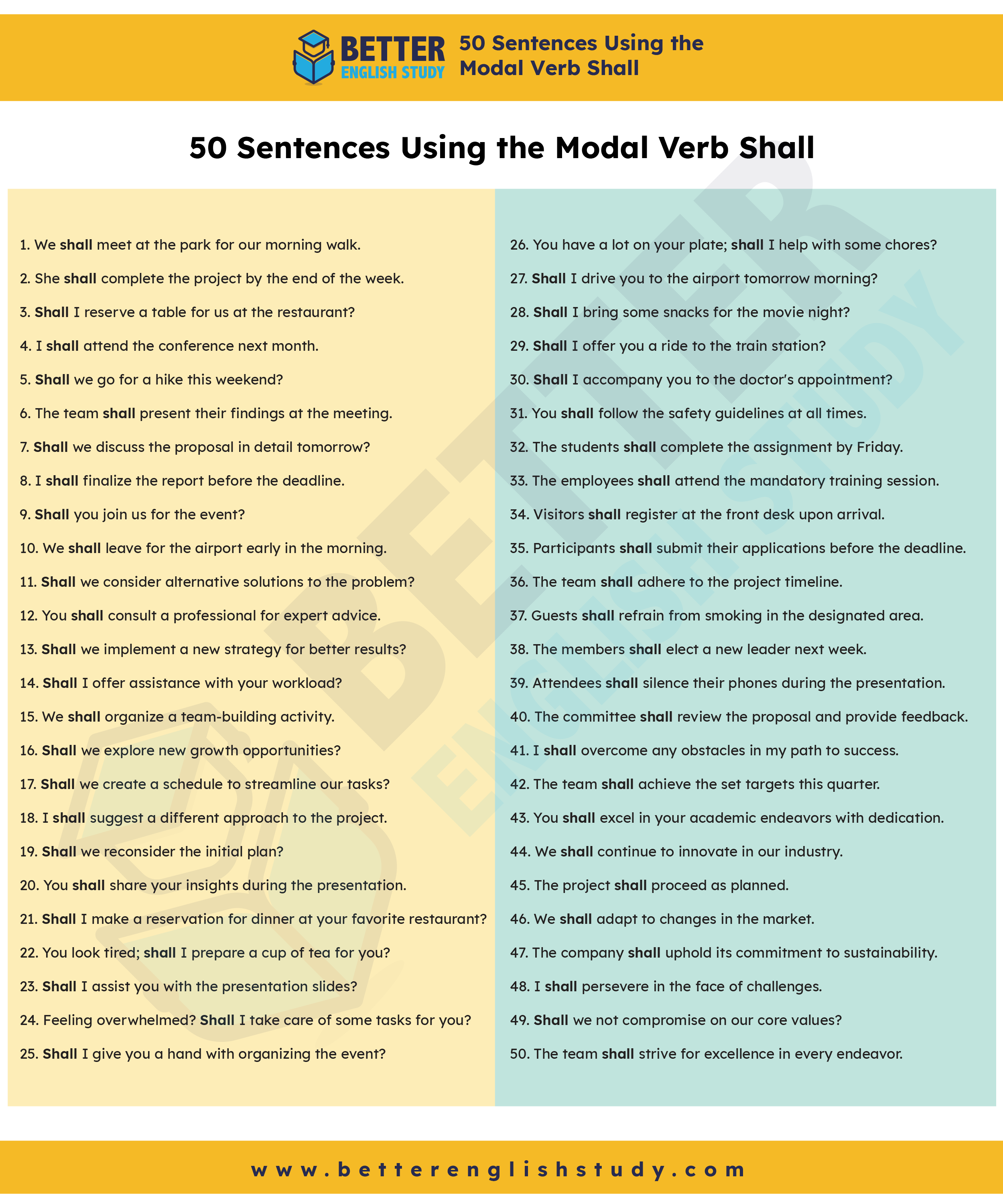
The modal verb “shall” is a versatile and often formal element of the English language, indicating various shades of meaning, from expressing future intentions and obligations to seeking suggestions and making inquiries. Understanding how to use “shall” correctly is crucial for effective communication.
In this article, we will explore 50 example sentences that showcase the diverse contexts in which the modal verb “shall” can be employed.
When to Use Shall
Before exploring the sentences, it’s essential to understand when to employ “shall.” This formal modal verb is commonly used to express obligations, make suggestions, issue commands, or formulate future predictions. Recognizing the contexts where “shall” is appropriate enhances your ability to convey a sense of duty and certainty in your communication.
For better knowledge, let’s explore the examples now.
1. Expressing Future Intentions
- We shall meet at the park for our morning walk.
- She shall complete the project by the end of the week.
- Shall I reserve a table for us at the restaurant?
- I shall attend the conference next month.
- Shall we go for a hike this weekend?
- The team shall present their findings at the meeting.
- Shall we discuss the proposal in detail tomorrow?
- I shall finalize the report before the deadline.
- Shall you join us for the event?
- We shall leave for the airport early in the morning.
2. Making Suggestions
- Shall we consider alternative solutions to the problem?
- You shall consult a professional for expert advice.
- Shall we implement a new strategy for better results?
- Shall I offer assistance with your workload?
- We shall organize a team-building activity.
- Shall we explore new growth opportunities?
- Shall we create a schedule to streamline our tasks?
- I shall suggest a different approach to the project.
- Shall we reconsider the initial plan?
- You shall share your insights during the presentation.
3. Offers
- Shall I make a reservation for dinner at your favorite restaurant?
- You look tired; shall I prepare a cup of tea for you?
- Shall I assist you with the presentation slides?
- Feeling overwhelmed? Shall I take care of some tasks for you?
- Shall I give you a hand with organizing the event?
- You have a lot on your plate; shall I help with some chores?
- Shall I drive you to the airport tomorrow morning?
- Shall I bring some snacks for the movie night?
- Shall I offer you a ride to the train station?
- Shall I accompany you to the doctor’s appointment?

4. Giving Commands or Orders
- You shall follow the safety guidelines at all times.
- The students shall complete the assignment by Friday.
- The employees shall attend the mandatory training session.
- Visitors shall register at the front desk upon arrival.
- Participants shall submit their applications before the deadline.
- The team shall adhere to the project timeline.
- Guests shall refrain from smoking in the designated area.
- The members shall elect a new leader next week.
- Attendees shall silence their phones during the presentation.
- The committee shall review the proposal and provide feedback.
5. Expressing Certainty or Determination
- I shall overcome any obstacles in my path to success.
- The team shall achieve the set targets this quarter.
- You shall excel in your academic endeavors with dedication.
- We shall continue to innovate in our industry.
- The project shall proceed as planned.
- We shall adapt to changes in the market.
- The company shall uphold its commitment to sustainability.
- I shall persevere in the face of challenges.
- Shall we not compromise on our core values?
- The team shall strive for excellence in every endeavor.
These 50 example sentences showcase the versatile applications of the modal verb “shall” in the English language. Whether expressing future intentions, making suggestions, seeking advice, giving commands, or expressing certainty, “shall” adds a touch of formality and authority to communication.
